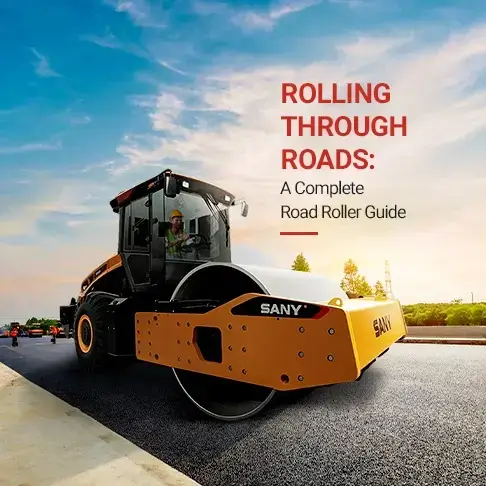Have you ever pondered over how roads achieve that seamless, robust finish we depend on daily? Well, it’s all thanks to road rollers – those large, unassuming machines you often spot at construction sites. Though they may not look glamorous, they play a crucial role in ensuring our roads are safe and durable. Regardless of whether you’re a newcomer to the world of construction or an old hand, comprehending road rollers is vital for accomplishing any project successfully. In this article, we’ll delve into the world of road roller machines, exploring their different types and offering some simple maintenance tips along the way. There are several types of road rollers, each designed for specific tasks and terrains. Let’s take a closer look at some of the most common ones. Vibratory rollers are the workhorses of road construction and repair projects. These rollers utilize vibrations to compact soil and asphalt, ensuring a uniform density and smooth finish. The high-frequency vibrations cause soil particles to shift and settle tightly together, creating a strong and stable foundation for roads, driveways, and other paved surfaces. Vibratory rollers are highly effective in compacting both granular materials and asphalt, making them incredibly versatile tools for various construction jobs. They often come equipped with adjustable settings that allow operators to customize the intensity of vibration according to the specific needs of the project. Unlike vibratory rollers, pneumatic rollers use rubber tires instead of steel drums for compaction. This makes them more flexible and adaptable to different applications. Pneumatic rollers are frequently used to seal and finish asphalt surfaces, providing excellent compaction and traction. Their rubber tires conform to the irregularities of the surface, ensuring even compaction without damaging the pavement. Moreover, pneumatic rollers are efficient in compacting cohesive soils and base materials. Operators can fine-tune compaction efforts by adjusting tire pressure depending on the particular conditions of the job site. Also known as smooth-wheel rollers, static rollers apply pressure to the surface without using vibrations. These rollers are typically used for the finishing touches and compacting thin layers of asphalt or soil. Static rollers excel at achieving smooth and uniform finishes on paved surfaces like roads, parking lots, and driveways. They distribute pressure evenly across the surface, gradually compacting the material below. Static rollers are often used alongside vibratory or pneumatic rollers to achieve the best compaction results. Although they might not be as versatile as vibratory or pneumatic rollers, static rollers are essential for delivering the final smoothness and density required for high-quality pavements. Road rollers are indispensable in various construction and maintenance projects, ensuring the longevity and quality of road surfaces. Proper upkeep is crucial for extending the lifespan and maintaining the efficiency of road rollers. Road rollers are essential tools in road construction and maintenance, ensuring safe and durable surfaces. By understanding the different types of road rollers, their applications, and maintenance needs, you can make informed choices to ensure successful projects. Selecting the right road roller is also important for achieving optimal results. Sany, a leading construction equipment manufacturer, offers a broad range of road rollers designed to meet the varied needs of contractors and construction professionals. With cutting-edge features, superior performance, and exceptional reliability, Sany road rollers are trusted globally to deliver outstanding outcomes. To find out more about road roller machine prices and the product lineup, visit our website. Aluminum Wire Mesh,Aluminum Square Wire Mesh,aluminum alloy wire mesh,Plain Weave Aluminum Mesh Screen Hebei Yingkang Wire Mesh Product Co.Ltd , https://www.wiremesh-china.com
Different Types of Road Rollers
Vibratory Rollers
Pneumatic Rollers
Static Rollers
Applications of Road Rollers
Maintenance Tips for Road Rollers
Conclusion
Alloy Metal Wire Mesh is a type of wire mesh that is made from a combination of different metals to provide enhanced properties like strength, durability, and corrosion resistance. These alloys can include materials such as stainless steel, copper, brass, aluminum, and others.
Here are some key characteristics and uses of alloy metal wire mesh:
1. **Strength**: Alloy metal wire mesh typically has higher tensile strength compared to pure metal wire meshes. This makes it ideal for applications where strength is a critical factor.
2. **Corrosion Resistance**: Some alloys, like stainless steel, offer excellent corrosion resistance. This makes alloy metal wire mesh suitable for use in environments where exposure to water, chemicals, or other corrosive substances is expected.
3. **Durability**: Due to their composition, alloy metal wire meshes are generally more durable than their single-metal counterparts. They can withstand high temperatures, wear and tear, and impacts better.
4. **Flexibility**: Depending on the alloy used, these wire meshes can be flexible enough for forming into various shapes without breaking.
5. **Versatility**: Alloy metal wire meshes are used in a wide range of applications including industrial screens, filters, architectural elements, and protective barriers.
6. **Cost-Effectiveness**: While initially more expensive than some single-metal options, alloy metal wire meshes often provide better performance over time, making them cost-effective for long-term projects.
Some common applications of alloy metal wire mesh include:
- **Industrial Filtration**: Used in the filtration of liquids and gases in chemical processing plants.
- **Agricultural Equipment**: For protective covers and screens in tractors, combines, and other agricultural machinery.
- **Construction**: As reinforcement in concrete structures or for fencing and security barriers.
- **Architecture**: For decorative purposes or as structural supports in building facades.
- **Screening and Separation**: In mining, food processing, and pharmaceutical industries for sieving and separating materials.
The choice of alloy depends on the specific requirements of the application, including environmental conditions, required strength, and durability.